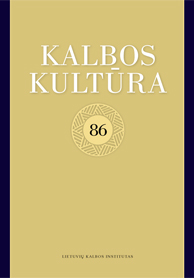Jonas Jablonskis ir tautos kalba
Jonas Jablonskis and the Language of the Nation
Author(s): Jonas KlimavičiusSubject(s): Baltic Languages
Published by: Lietuvių Kalbos Institutas
Keywords: Jablonskis; jablonskiana;language; nation; language of the nation; national function of the language;
Summary/Abstract: Jonas Jablonskis should first be seen as a solid integral personality and a modern man of his time, known as the Spring of Nations, his place, Eastern Europe, known as the homeland of the small nations, and his nation. Instead of being classified flatwise, his abundant activities should be organised in a hierarchical order by highlighting the landmarks of his life and the milestones of his activities. The road of Jablonskis primarily relied on the very foundations, i.e. the existence of the language and the nation, national education, independence, followed by the landmarks of language, i.e. the standard language as the national foundation (people’s language), a well-founded principle of dictionary and syntax purity implemented by the fruitful formation of new words and the description of syntax based on pure authentic data. An outline of grammar withstood the trials of the century. The evaluations of certain specific aspects – grammar and word-formation – are lacking a thorough study; a simple and strict systemization which is not testified by language data, as contemporary sources show (Dictionary of Lithuanian, etc.), was unduly relied upon. A long, continuous and persistent practice of numerous corrections (Gimtoji kalba – Language Matters, etc.) is to the most part correct; self-corrections are occasional; in some cases, they are ill-founded but not always refused. Though it could and should have been more fruitful, in particular in the free press, mostly during the decades of independence of universities and gymnasiums, it was often approached without due attention, even with bitter hostility, in particular by the press and even by certain writers, which, by the way, is still apparent today. Occasional invalidities and their blind acceptance as well as unreasonable rejections require the most thorough targeted studies and the most valid conclusions. Blunt repetitions of long-established matters push away from both Jablonskis and the language. Not every step he had taken should be blindly followed – landmarks should first be observed. The road of the jablonskiana which had begun during his lifetime was marked by 5 volumes of his writings (articles), 2 volumes of grammars as well as a 2-volume monograph, studies, numerous articles and rather rich, though mostly insistent, empty, even nihilistic, polemic. Jablonskis has been better studied and described than fully understood and duly acknowledged. The greatest theoretical misunderstanding is the attempt to address our peculiar road of the nation and the language according the pattern of the great Western languages.
Journal: Bendrinė kalba (iki 2014 metų – Kalbos kultūra)
- Issue Year: 2013
- Issue No: 86
- Page Range: 9-49
- Page Count: 41
- Language: Lithuanian

